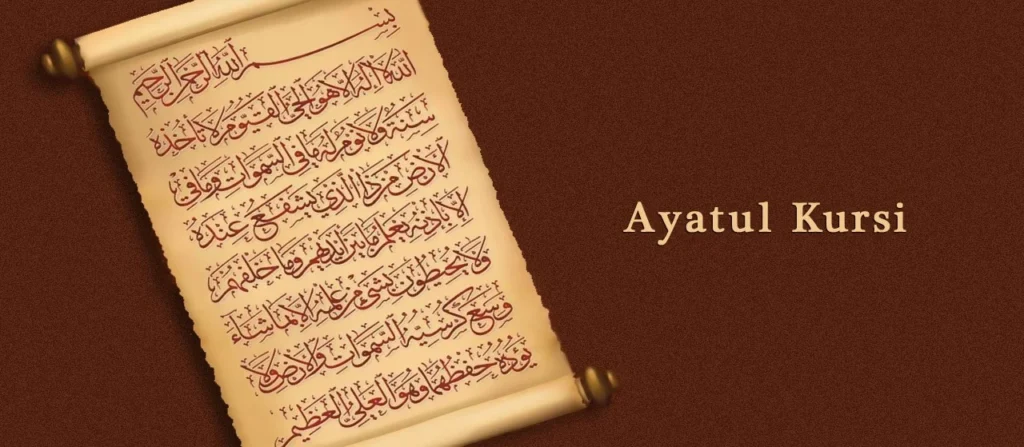In the realm of Islamic teachings, certain verses hold profound significance, transcending mere words to embody spiritual power and divine protection. Among these treasures is Ayat ul Kursi, a verse found in the Qur’an renowned for its immense benefits and importance in the lives of believers.
Introduction to Ayat al-Kursi
Ayat ul Kursi, also known as the Throne Verse, is the 255th verse of Surah Al-Baqarah (The Cow) in the Qur’an. It is revered by Muslims worldwide for its potency and spiritual significance. Comprising just a few lines, this verse encapsulates profound truths about the nature of Allah and His sovereignty.
The Importance of Ayat ul Kursi in Islam
The Significance of the Verse:
Ayat ul Kursi is often recited for protection, blessings, and spiritual elevation. Its significance lies in its description of Allah’s attributes, emphasizing His omnipotence, omniscience, and mercy. Believers find solace and strength in the words of this verse, seeking refuge in Allah’s limitless power and guidance.
Scriptural References:
The importance of Ayat ul Kursi is underscored by its placement within the Qur’an, following a discourse on various aspects of faith and righteousness. Its position immediately after a discussion on Allah’s authority and knowledge highlights its central role in Islamic theology.
Benefits of Reciting Ayat ul Kursi
Protection from Evil:
One of the most celebrated benefits of reciting Ayat ul Kursi is its protective nature. Muslims believe that invoking this verse shields them from harm, both physical and spiritual. It acts as a barrier against malevolent forces, offering a sense of security and peace to those who recite it with sincerity.
Strengthening Faith:
Reciting Ayat ul Kursi regularly deepens one’s connection to faith. The verse serves as a reminder of Allah’s presence and guardianship, fostering trust and reliance on Him in times of adversity. Through its recitation, believers reaffirm their belief in the unseen and the divine decree.
Spiritual Benefits:
Beyond its tangible effects, Ayat ul Kursi brings spiritual nourishment to the soul. Its words resonate with a sense of awe and reverence, drawing individuals closer to the divine. Reciting this verse instills a sense of humility and gratitude, reminding believers of their place in the vastness of creation.
Understanding the Verse
Interpretation and Commentary:
Scholars and exegetes have offered various interpretations of Ayat ul Kursi, delving into its linguistic, theological, and metaphysical dimensions. Some view it as a proclamation of Allah’s sovereignty over the universe, while others emphasize its role in affirming monotheism and divine authority.
Historical Context:
The historical context of Ayat ul Kursi enriches its meaning and relevance. Revealed in the aftermath of the Battle of Uhud, it served as a source of consolation and reassurance to the early Muslim community facing adversity. Its timeless message continues to resonate with believers across generations.
Methods of Incorporating Ayat ul Kursi into Daily Life
Recitation after Prayers:
Many Muslims incorporate the recitation of Ayat ul Kursi into their daily prayers, seeking its blessings and protection. Its rhythmic verses lend themselves to memorization, allowing believers to invoke its power at various moments throughout the day.
Hanging it in the Home:
Some families choose to display Ayat ul Kursi prominently in their homes, believing it brings blessings and tranquility to the household. Whether inscribed on a decorative plaque or framed artwork, the verse serves as a constant reminder of Allah’s presence and protection.
Memorization and Recitation:
The act of memorizing Ayat ul Kursi is considered a virtuous endeavor in Islam. Many children are taught to recite it from a young age, instilling in them a love for the Qur’an and its teachings. Memorization fosters a deep connection to the verse, allowing its words to resonate in the heart and mind.
Stories and Anecdotes about the Power of Ayat ul Kursi
Throughout history, countless stories have emerged illustrating the transformative power of Ayat ul Kursi. From miraculous interventions to personal testimonies of divine protection, these narratives serve as a testament to the verse’s enduring impact on the lives of believers.
Scientific Perspectives on the Benefits of Reciting Ayat ul Kursi
While the benefits of reciting Ayat ul Kursi are primarily spiritual in nature, some scholars have explored its potential psychological and physiological effects. Studies on the therapeutic benefits of reciting sacred texts suggest that the act of recitation may induce a sense of calm and well-being.
Conclusion
In conclusion, Ayat ul Kursi stands as a beacon of light and guidance for Muslims around the world. Its profound significance transcends time and space, offering solace, protection, and spiritual nourishment to those who seek it. By understanding its importance and incorporating it into daily life, believers can tap into its transformative power and draw closer to the divine.
FAQs about Ayat ul Kursi
Q1. What is Ayat ul Kursi?
Ans. Ayat ul Kursi is the 255th verse of Surah Al-Baqarah in the Qur’an, revered for its spiritual significance and protective qualities.
Q2. How often should one recite Ayat ul Kursi?
Ans. While there is no prescribed frequency, many Muslims recite it daily for blessings and protection.
Q3. Can non-Muslims benefit from reciting Ayat ul Kursi?
Ans. While Ayat ul Kursi holds significance within Islamic tradition, individuals of all faiths may find solace in its universal message of divine guidance and protection.
Q4. Is there a specific time or place for reciting Ayat ul Kursi?
Ans. Ayat ul Kursi can be recited at any time and in any place, though some may choose to recite it after prayers or during moments of contemplation.
Q5. Are there any specific rituals associated with reciting Ayat ul Kursi?
Ans. Reciting Ayat ul Kursi is often accompanied by seeking Allah’s protection and blessings, though no specific rituals are required.
If you want more Quranic Blogs Click Here! And Download AnalyzeQuran App Click Here!

